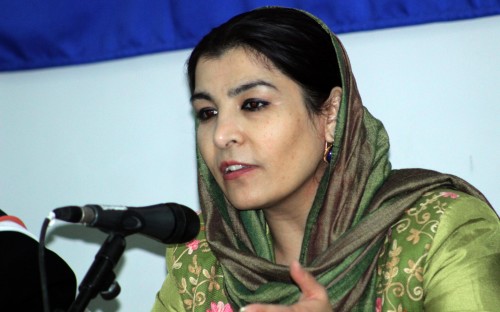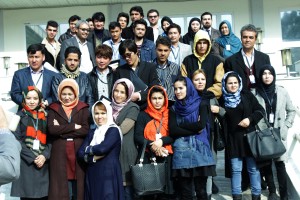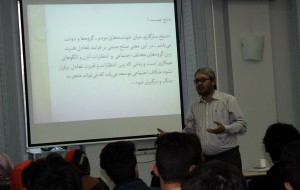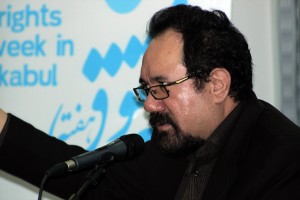Three days of workshops in Human Rights Week
Armanshahr Foundation/OPEN ASIA organised educational workshops during the Human Rights Week (7-10 December 2015) on CEDAW, and UN Resolutions 1325 and 1820 concerning women, conflict and war. All the programmes were conducted in collaboration with and with the support of the EU, the French Embassy, the French Institute Afghanistan, UN Women in Afghanistan, and the Swiss Cooperation Office Afghanistan.
Reza Hosseini, director of Advocacy Department of Afghanistan Centre, was the main instructor of the workshops. Sadeq Bagheri, doctor of international relations and university professor, and Horia Mosadiq, Amnesty International researcher, as guest instructors, accompanied him on the final two days.
First day: UN Resolution 1325
The first day opened with more than 35 participants and Armanshahr Foundation management members. This workshop was concerned with: basic concepts in Resolution 1325, i.e. peace, security and gender; an introduction to the resolution; objectives of the resolution.
The Resolution is significant concerning women’s rights during conflict and war. In this context, the obstacles and challenges and measures taken by the Afghanistan government were examined and concepts of peace, mentality of peace and justice in respect of women’s rights were touched upon.
At the beginning, Mr Hosseini defined “peace” as “compatibility of demands of the people, groups and government,” and argued that if balance was not established between expectations and power, “the societal gap would expand and can lead to war and conflict.”
One of the participants said the opposition had always committed crimes and the government was trying to reach peace with it. Hosseini explained: “We have been talking about peace for many years, but we have not reached any results. We have no other choice. If not peace, then what? What other option do we have? We have to endeavour to achieve peace and, in doing so, get to know the international law.”
One other participant said: We do not know where the ISIS and the Taliban are and with whom are we supposed to reach peace? When we enter negotiations with them, we recognise them.
Hosseini confirmed and explained: “Peace-building is a trend between two parties. As civic activists, we must let them state their demands. We cannot refuse to hear them, just because they are not a credible source. They are the opposite party and we need to negotiate in order to reach peace, otherwise war will continue. The specific approach of the Taliban to women exists in our collective memory and we have to consider it in the question of peace, because we know they are opposed to it. We noticed that the Taliban have also accepted the issue to some extent by meeting the representative of Afghanistan’s women and accepted Ms Shokria Barakzai to take part in the talks.”
Hosseini also said women played several roles in the peace process: mediator or member of mediation team, representative of the negotiating team, signatory, witness, observer as representative of the civil society, creating a parallel movement, advisor on gender issues for mediation, facilitator, and member of technical committee or working group on gender issues.
Second day: UN Resolution 1820
The second day’s workshop on Resolution 1820 had the following agenda: An introduction to the resolution, transitional justice, and transitional justice and gender.
The lead instructor, Mr Hosseini talked about the 1994 Rwandan genocide in the introduction and presented stories about the victims.
The guest instructor of the second day, Dr Sadeq Bagheri spoke about the improvement in legal conditions of women and the deterioration of their social condition. He said: The issuing of six important resolutions by the UN, e.g. 1325, 2122, 1960, showed that there is special attention to women and prohibition of discrimination. The resolutions were a positive development in regard to the ban on violence against women. However, they also show the grave condition of women. The six resolutions are indeed instructions to provide for women’s rights during war.
He explained: Resolution 1820 has outlined the issues of violence and discrimination against women, which relate to international order and security. The UN Security Council is somehow the world police and can intervene when there are problems with world order and security… The Resolution has dealt with responsibility of the governments, too.
Some of the participants asked about the legal vacuum in regard to women and mechanisms of monitoring the implementation of international conventions.
Bagheri’s response was: One of the problems is the existence of numerous laws with conflicting provisions. Governments are obliged to implement the international law, but they do not wish to enact legislation that would make them committed later. Most of them integrate the international law within the domestic law.
In the second part, Mr Hosseini discussed transitional justice and explained its emergence and mechanisms as well as the truth commissions in Argentina, Uganda, Sri Lanka, Guatemala and South Africa.
As to the question of the monitoring mechanism, he explained that human rights bodies should report to the UN; the people, parliament and the civil society should exert pressure domestically. There should also be a court or other competent body, where the issue can be referred to. The government must be forced to create the court.
He explained that amnesty is a part of the transitional justice, but many crimes are not forgivable, unless individuals forgive.
On the topic of gender and transitional justice, Hosseini explained: Women have been recognised neither as fighters nor as victims in Afghanistan. When a sexual crime is committed on a woman, it is cause for shame and nobody is prepared to talk about it. This increases the deprivation and victimisation of women many folds and marks the beginning of many more pains. Even the Bonn Conference and various studies have made fleeting references to this issue. The Resolution, however, says such crimes must not be pardoned, because they are not redressable, e.g. rape.
Third day: CEDAW
The third international instrument to be examined and discussed was The Convention on the Elimination of All Forms of Discrimination against Women (CEDAW). After an introduction to CEDAW, the status of CEDAW vis-à-vis Islamic countries was considered. The instructor was Reza Hossein and the guest instructor was Horia Mosadiq, who spoke about her experience in Afghanistan and the civic struggles to improve human rights.
Hosseini said: Governments party to this Convention are required under Article 18 (2) to report to the UN Committee on the Elimination of Discrimination against Women every four years. Some Islamic states, e.g. Iran, Saudi Arabia and Somalia have not joined this Convention. Some have accepted it conditionally.
Horia Mosadiq said: Afghanistan is still grappling with traditions. Women are facing many challenges. We have many enemies among the traditionalists and extremists and we face threats and violence.

Ms Horia Mosadiq, Amnesty International’s Afghanistan Researcher
Pointing out that Afghanistan had signed CEDAW in 1980, she said: Many countries, e.g. the US, were opposed to the Convention, but Afghanistan accepted it. Women have always been a political ploy in Afghanistan. They have had a difficult path. Afghanistan was ahead of some European states in granting voting rights to women. It is occasionally said that violence has increased. I say, violence existed before, but it is reported more frequently now.
Mosadiq argued that Afghanistan is confronted with ‘traditional beliefs’: They believe a woman’s place is at home and then in grave. A woman who goes out is not a woman any more. The issue of Farkhonda showed us how the people think. Unfortunately, this attitude to women prevails among higher ranking women. They look down at you, when they realise you do not have a son.
She went on: We need to undertake serious work concerning traditions and extremism. We have to start among ourselves and our families. Many women defend women’s rights, but they are subjected to violence. Men and women are equal under the Constitution, but we do not see that equality anywhere. Our quota in the parliament is 25 percent. As young people and activists, you should be sensitive to the Law for Prohibition of Violence against Women and support it. You should also be sensitive in regard to monitoring of law implementation and advocate it.




